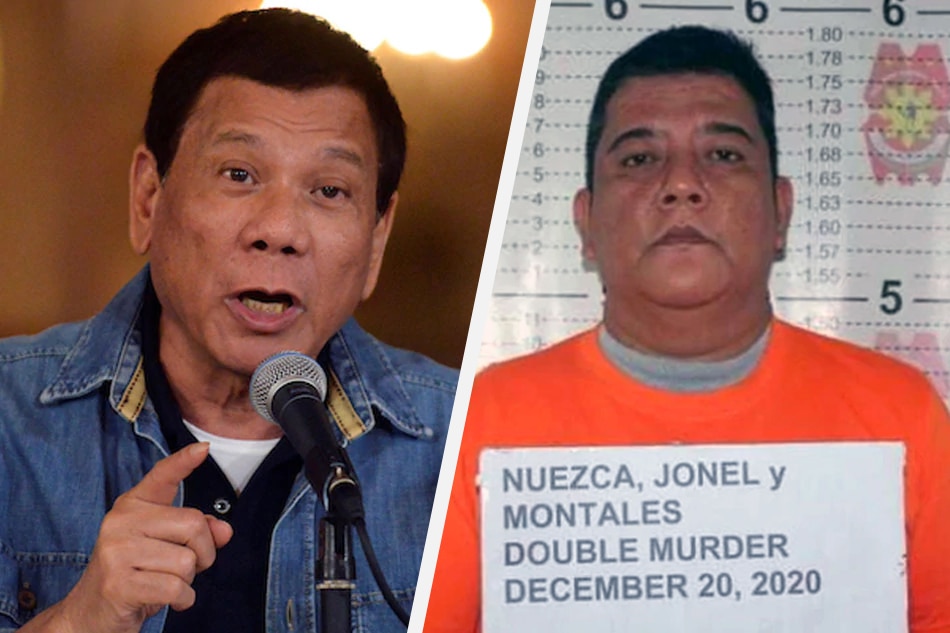Can the President validly pardon a killer? Yes.
 Except in cases of impeachment, or as otherwise provided in the Constitution,
the President may grant reprieves, commutations, and pardons, and remit
fines and forfeitures, after conviction by final judgment. (Section 19,
Article 7, 1987 Constitution)
Except in cases of impeachment, or as otherwise provided in the Constitution,
the President may grant reprieves, commutations, and pardons, and remit
fines and forfeitures, after conviction by final judgment. (Section 19,
Article 7, 1987 Constitution)
Based on the above constitutional provision, can the President then validly
pardon Jonel Nuezca? The answer is in the affirmative.
On December 20, 2020, a shooting incident occurred in Paniqui, Tarlac,
Philippines, when an off-duty police officer, Jonel Nuezca, fatally shot his
two unarmed neighbors following an argument over an improvised noise maker
known locally as boga. The incident was caught on camera and went viral on
social media, sparking nationwide outrage with some critics blaming the
government over acts of impunity and human rights abuses in recent
years. (https://en.wikipedia.org/wiki/2020_Tarlac_shooting, citing
Gutierrez, Jason. "A Brazen Police Shooting Caught on Video Sparks Anger in
the Philippines". The New York Times. Retrieved December 22, 2020)
Pardon is an act of grace proceeding from the power entrusted with the
execution of the laws, which exempts the individual on whom it is bestowed
from the punishment the law inflicts for a crime he has committed. It is a
voluntary act of the sovereign, granting outright remission of guilt and
declaring record that a particular individual is to be relieved of the legal
consequences of a particular crime. Amnesty commonly denotes a general pardon
to rebels for their treason or other high political offenses, or the
forgiveness which one sovereign grants to the subjects of another, who have
offended by some breach the law of nations. (PADILLA, J., dissenting, Llamas v. Executive Secretary, G.R. No. 99031, October 15, 1991)
The philosophy behind the grant of power to the President to grant executive
clemency is founded on the recognition that human institutions are imperfect
and that there are infirmities, deficiencies or flaws in the administration of
justice. The power exists as an instrument or means for correcting these
infirmities and also for mitigating whatever harshness might be generated by a
too strict an application of the law. (PADILLA, J., dissenting, Llamas v.
Executive Secretary, G.R. No. 99031, October 15, 1991)
A commutation of sentence is the reduction of penalty imposed while reprieve
is defined as the temporary suspension of the execution of a sentence,
especially of a sentence of death. The object of commutation of sentence is
the rehabilitation the criminal offender. The law of respite or reprieve
appeal to apply only to capital sentences. (PADILLA, J.,
dissenting, Llamas v. Executive Secretary, G.R. No. 99031, October 15,
1991)
From the foregoing definitions of the different forms by which the President
may exercise the power to grant executive clemency, it is plainly evident that
the intention of the Constitution is to empower and enable the President to
afford relief from enforcement of the criminal law which imposes penalty and
which appears unduly harsh. However, the President's pardoning power cannot be
used to release or destroy the civil rights or remedies of private
individuals, or to relieve against private obligations, civil penalties and
forfeitures, or an order or judgment in a civil action or proceeding, or an
administrative proceeding. (PADILLA, J., dissenting, Llamas v. Executive
Secretary, G.R. No. 99031, October 15, 1991)
A pardon is a form of executive clemency that is granted
post-conviction. (Jodesz Gavilan, 2020. What you need to know about presidential pardons. https://www.rappler.com/newsbreak/iq/things-to-know-presidential-pardons-philippines.)
A 2003 report by the Department of Justice refers to pardon as “an act of
grace from the Chief Executive absolving a person from the punishment
prescribed for the crime he has committed.” A pardon does lead to "the
restoration of the right to hold public office, or the right of suffrage”
unless explicitly stated in the pardon conditions. It, however, does not
absolve the convict from paying civil indemnity imposed by the sentence. The
Philippine president has the power to grant a pardon, as stated in Section 19,
Article VII of the 1987 Constitution. This power does not cover those who
violated election laws, in which any petition for pardon has to have the
approval of the Commission on Elections. (Jodesz Gavilan, 2020. What you need to know about presidential pardons. https://www.rappler.com/newsbreak/iq/things-to-know-presidential-pardons-philippines)
There are two types – absolute pardon and conditional pardon.
The Parole and Probation Administration defines an absolute pardon as the
“total extinction of the criminal liability.” “It restores to the individual
his civil and political rights and remits [or cancels] the penalty imposed for
the particular offense of which he was convicted.”
A conditional pardon, meanwhile, refers to the “conditional exemption of a
guilty offender for the punishment imposed by a court.” This means that there
would be certain limits imposed and that criminal liability is only partially
extinguished, according to Article 94 of the Revised Penal Code. A person
granted a conditional pardon is required to abide by the limits and guidelines
imposed. He or she is also required to be under the supervision of a pardon
officer. Non-compliance shall result in the revocation of the pardon. (Jodesz Gavilan, 2020. What you need to know about presidential pardons. https://www.rappler.com/newsbreak/iq/things-to-know-presidential-pardons-philippines)
